Coin Values Moving with Precious Metals: Up-Dated 1/26/2026: Gold $5072 | Silver $107.48
1945 Penny Value
A popular variety to 1945 penny value is the "S" mint, San Francisco issue. Throughout the Wheat cent years low production was typical of the San Francisco mint. First step is to separate these from the rest. Proceed through the value process of inspecting: Date | Mint Mark | Condition
Second step is judging Condition. Examples with light wear, indicating higher condition are uncommon and worth a premium.
Comparing to images determines both, identity of mint mark and grading condition.
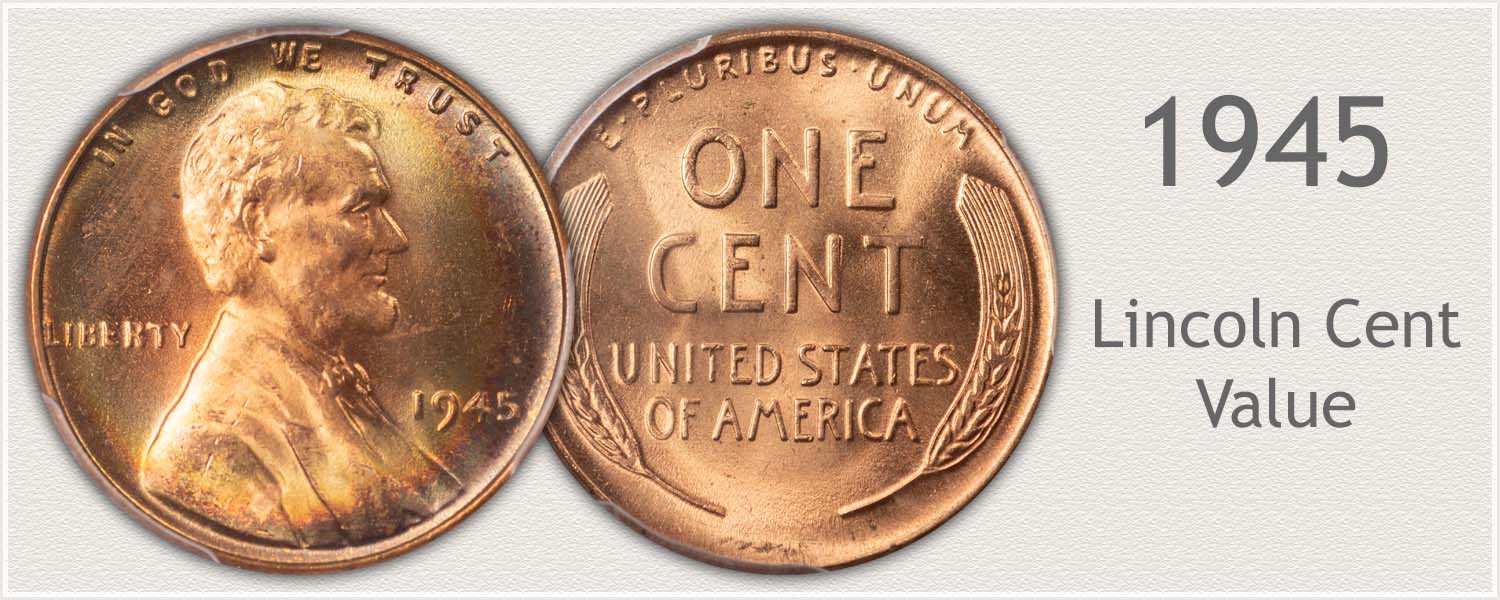
Steps Leading to Value:
- Step 1: Date and Mintmark Variety – Identify each date and its mintmark variety.
- Step 2: Grading Condition – Judge condition to determine grade.
- Step 3: Special Qualities – Certain elements either enhance or detract from value.
| 1945 Lincoln Penny Value | ||||
|---|---|---|---|---|
| Condition of Coin | ||||
| Date | Good | Fine | Extremely Fine | Uncirculated |
| 1945 Lincoln Penny Value Up-Dated | 2026 | |||
| 1945 | $0.02 | $0.02 | $0.03 | $1.88 |
| 1945 D | $0.02 | $0.02 | $0.03 | $1.92 |
| 1945 S | $0.02 | $0.03 | $0.04 | $1.74 |
A value process identifies three main factors: Date | Mint Mark | Condition
Listings of 1945 pennies begin with Date and Mint Mark combinations. Close-up images help identify and confirm the correct variety.
Grading condition follows. Additional categories on the chart separate values by condition. A set of images showing a progression of wear helps visualize the differences. Descriptions of important areas to judge helps match your coin to a grade. Each different combination of these factors is listed on the value chart.
Step 1: | Date and Mintmark Combination
Three Varieties of 1945 Penny
1945 places 4th in highest total mintage of wheat series Lincoln cents. San Francisco variety pennies continue the trend of producing the fewest for the year. Popular with collectors and one to inspect for condition.
1945 Lincoln Penny
No Mintmark Under Date: Philadelphia Mint Struck the Coin
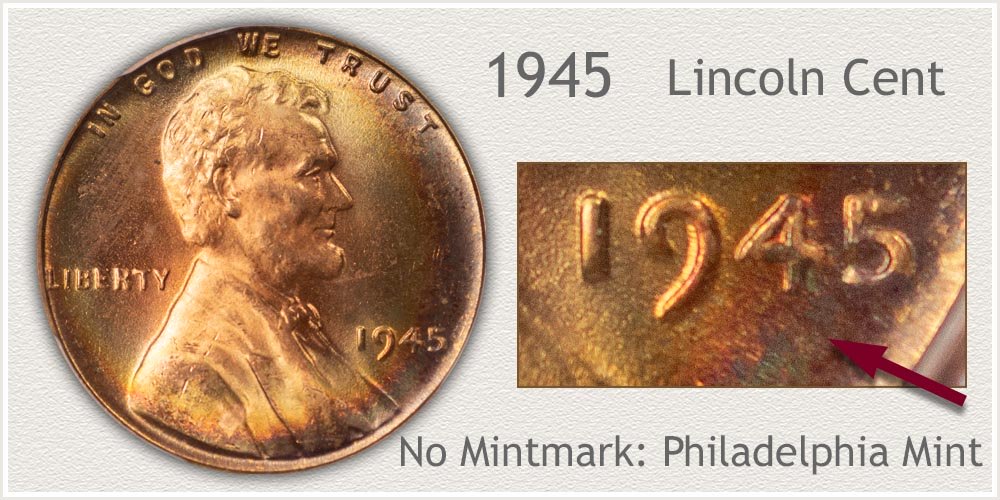
Second largest total from the Philadelphia mint during the wheat series. Again over 1 billion struck, following the record previous year. 1,040,515,000 total.
Ample quantities available, placing: Abundant on a rarity scale. To set a coin apart from the large numbers known requires an added appeal. Many exist in Mint State condition - like new - collectors favor those still bright with no fading of original red color. Circulated coins with very light wear are favored by beginning and young collectors.
1945-D Lincoln Penny
"D" Mintmark Under Date: Denver Mint Struck the Coin
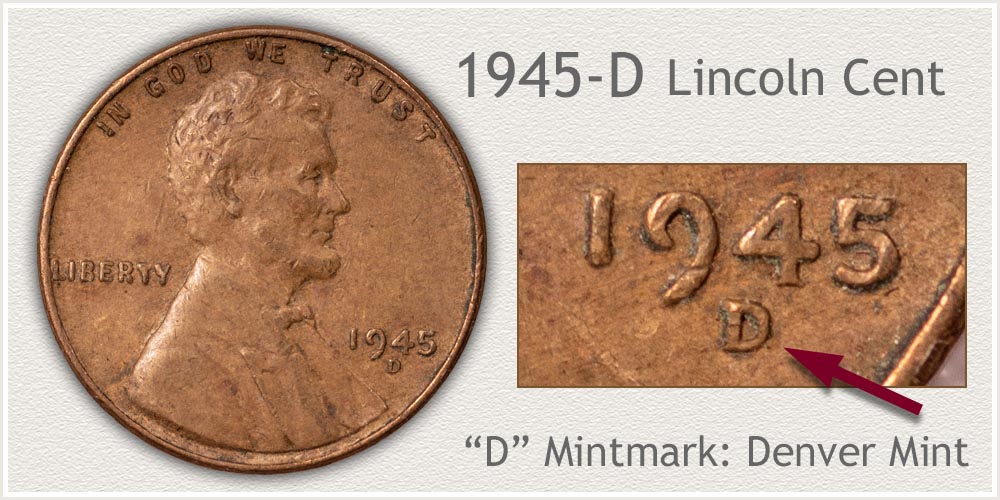
Abundant on a rarity scale. Denver 1945 cents are needed as part of the varieties struck that year. Collectors are the strong base to value, noting the value chart, their preferences are in the Extremely Fine grade.
Desirable as part of collections are 1945-D pennies lightly worn or better condition. Adding to appeal are coins without a combination of dark and light areas. Depending on conditions of storage, deep irregular toing is imparted. Evenness of coloration defines higher appeal.
1945-S Lincoln Penny
"S" Mintmark Under Date: San Francisco Mint Struck the Coin
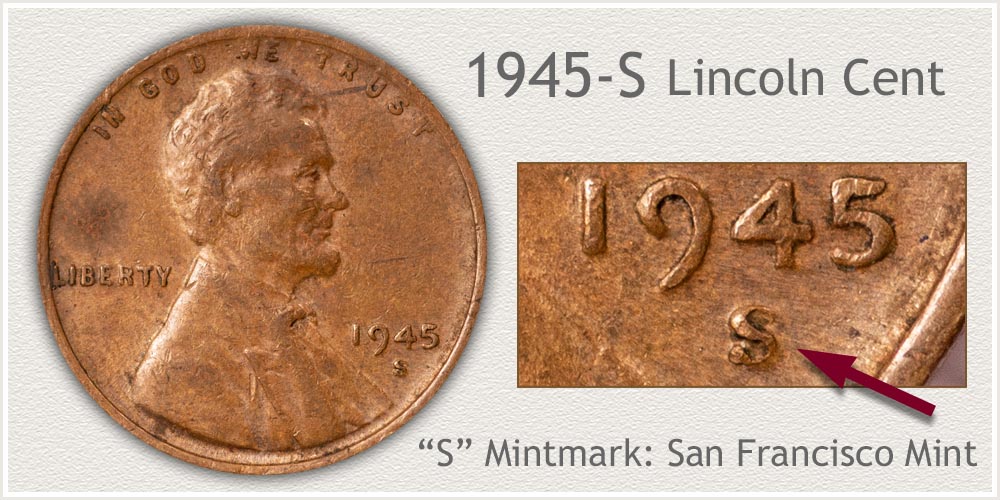
San Francisco struck the fewest of the three varieties of 1945 cents. Continuing a trend of lowest production throughout the series.
All varieties of each date are sought as part of collections. 1945-S pennies hold a small premium in circulated grades. Separate and give a closer inspection to each, looking for bold lines within Lincoln's shirt and coat. Grading, the next step finds higher end examples.
Step 2: | Judge Condition to Identify Grade
Grade Separates Average from Above Average 1945 Penny Value
Collectors inspect each coin, judging condition and looking for above average examples. Grade, a notation of condition, is determined and used as part of the description of the coin. Collectors and dealers now combine date, mintmark, and grade as they value an individual coin.
Grading pennies involves close inspection of small areas; a magnifying glass is useful. If a magnifying glass is not available, an image is often taken and used to enlarge key points.
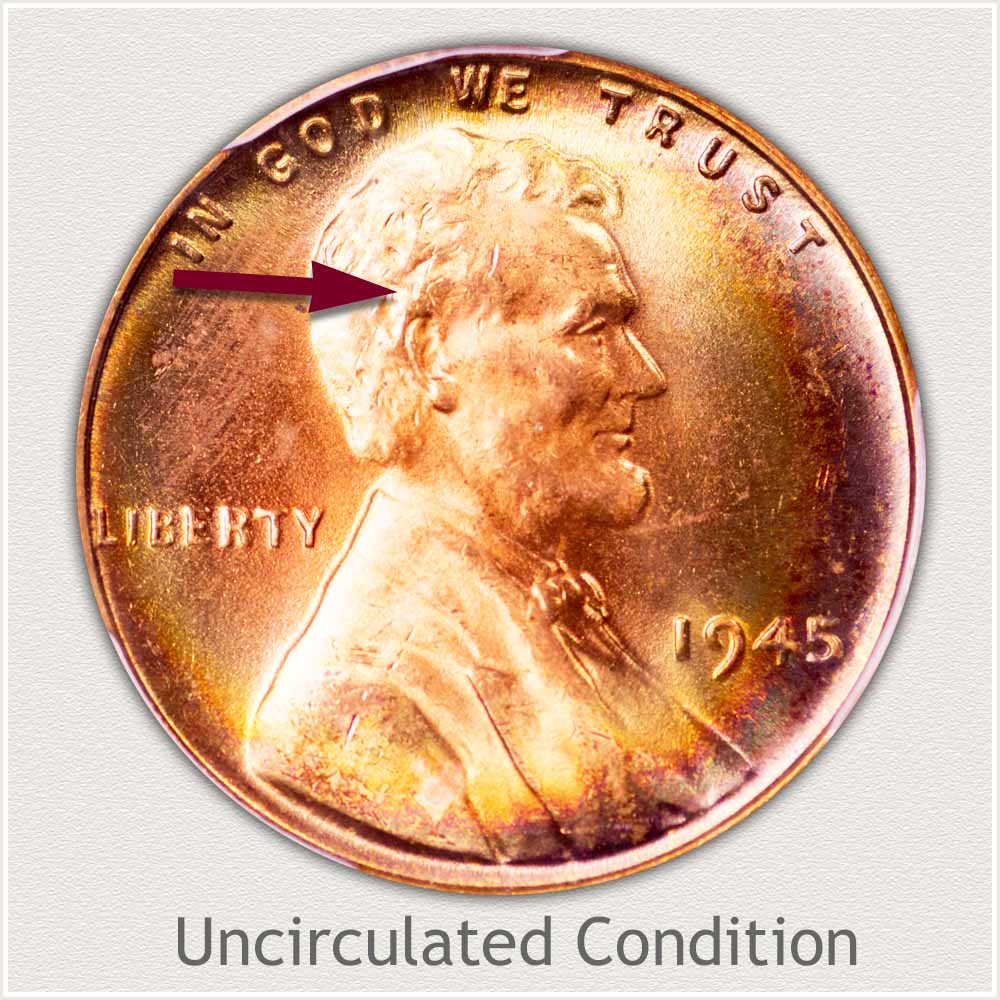
Uncirculated Grade: Within Lincoln wheat penny series, coins in mint state - uncirculated grade are a favorite with collectors. Defining an uncirculated grade is complete absence of wear to the surfaces of the coin. Bright luster is often present but not necessary to qualify as a mint state example.
On well preserved wheat cents bright - untoned luster is a plus adding to value. Copper does tone shades of brown over time with this toning laying on top of original surfaces. Lack of wear is a true indicator of the mint state grade. Look closely at Lincoln's cheek just below the eye. Any smoothing of texture indicates circulation wear.
Image is a very nice 1945 Lincoln penny, bright with original shine. A small degree of toning is developing along the rims framing the center and adding eye appeal.
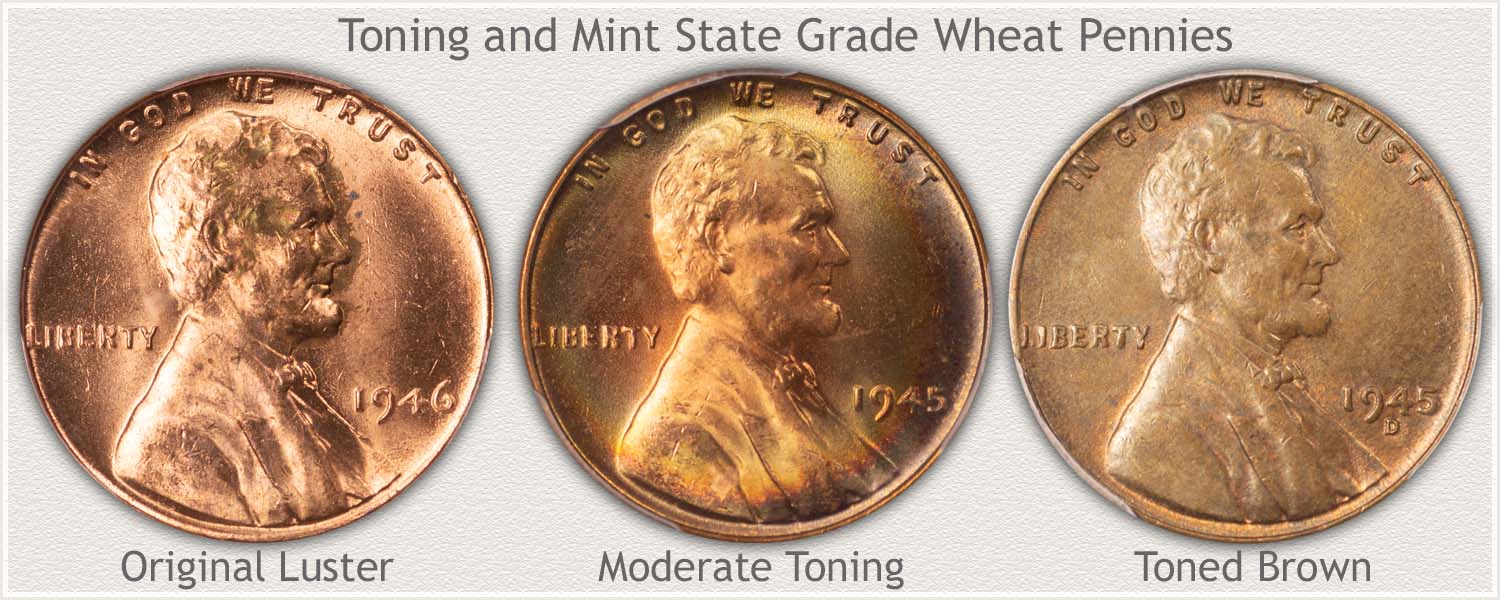
Judge Color and Wear of 1945-Penny Toning and wear are natural to coins entering circulation. Wear disrupts luster and causes removal of metal. Presence of toning is not an indication of wear. Toning occurs independent of wear; it covers the surface in any condition.
Inspecting the cheek of Lincoln shows no wear. Laying on top of the surface the moderate toned 1945 penny still retains the fine grain of original surfaces. Looking "through" the soft brown of the toned coin finds no wear and smoothing to the surface.
Tilt coins at a sharp angle, magnify into a high point, in this case the cheek below the eye, and judge for any smooth surface different from the surrounding area.
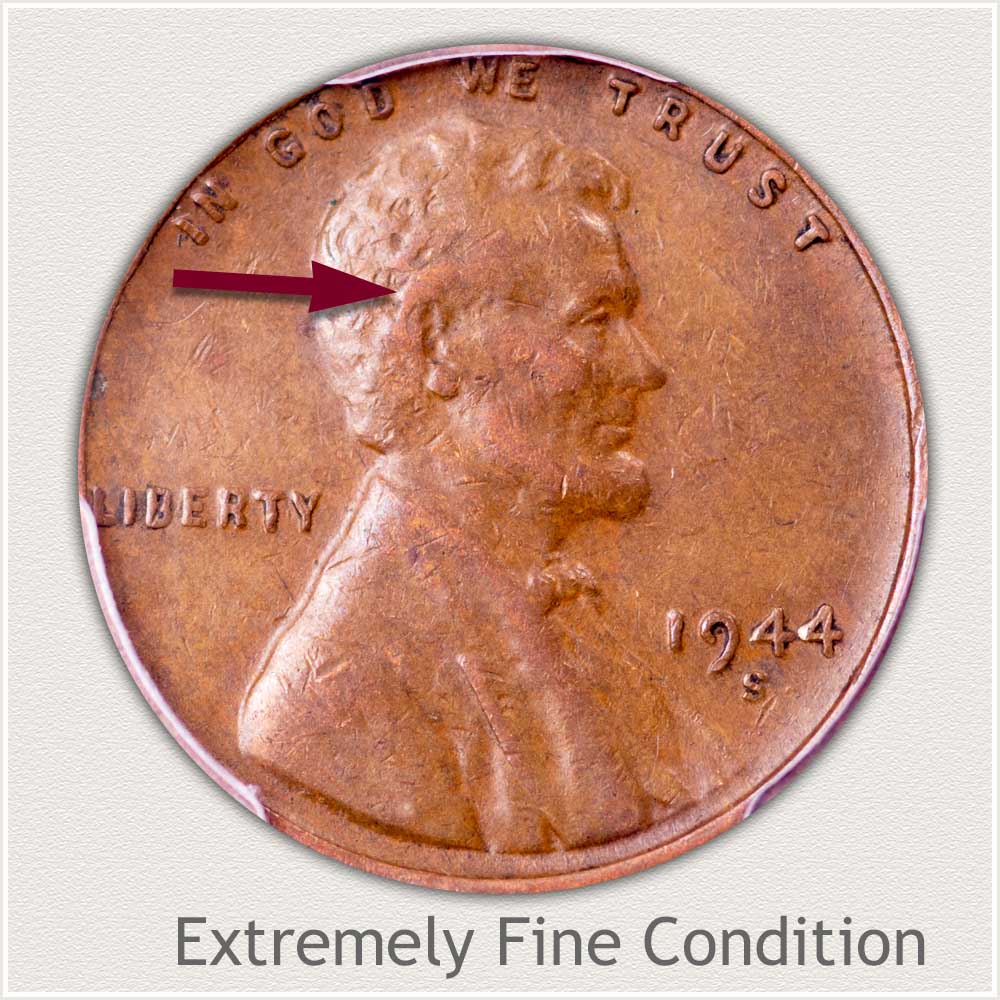
Extremely Fine Grade: Light wear is confined to the highest points of the design on Lincoln cents in extremely fine grade. Key to the grade is light wear and the slightest merging of design elements.
Lincoln's cheek is well defined and almost completely rounded in profile. A small flat area is visible just below the eye but the cheek is well separated from his nose. Original texture to the surface remains in the protected areas of the eye and just below. With only evidence of wear extending towards the ear all elements remain bold.
Soft brown toing of the center is surrounded by deeper shades towards the rim. A pleasing contrast of colors lends well to eye appeal. No large nicks distract and main features remain bold and well detailed. Lincoln cents minted in the 1940's are collectible quality in extremely fine grade.
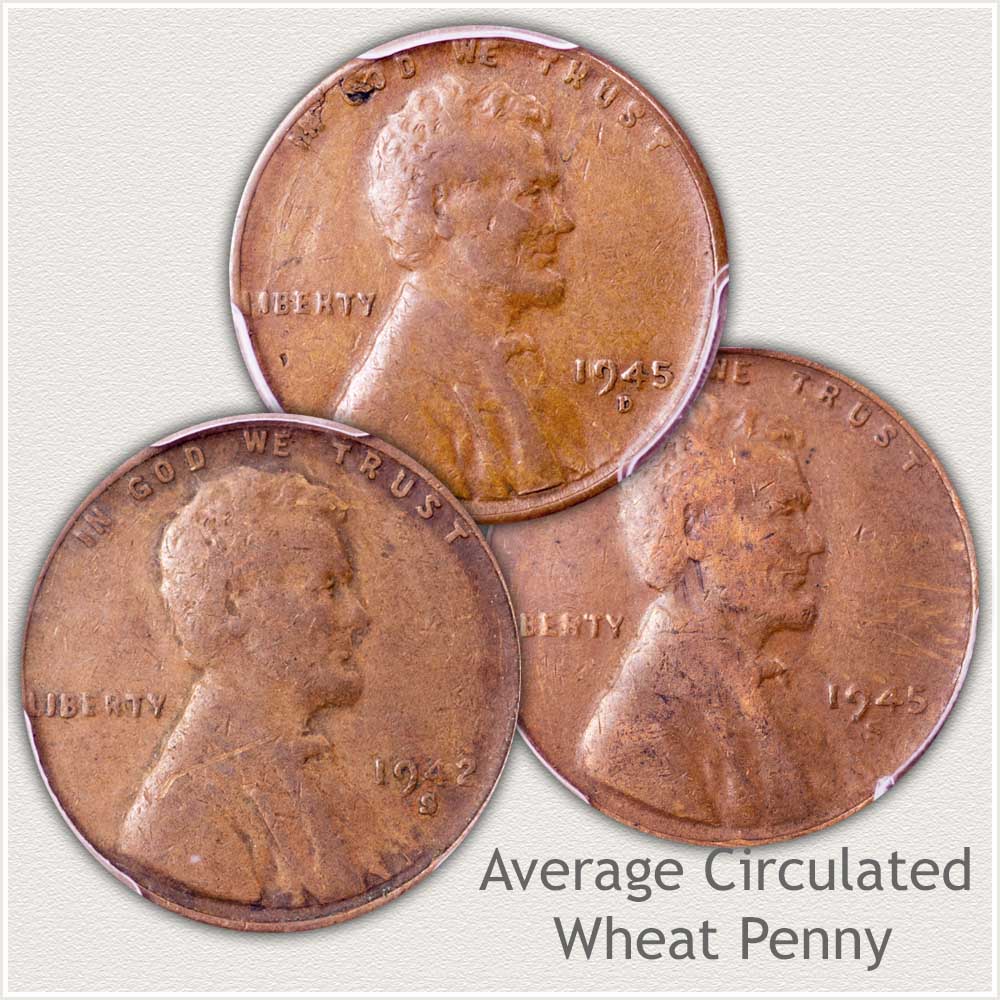
Average Circulated Condition: Moderate wear has lowered the profile and merged many design details on lower condition wheat cents. These coins have worn to a point grading below the extremely fine grade.
Overall view of the examples identify smoothing over Lincoln's cheek and jaw, and many finer details of hair. In the era of 1944 through 1958, coins in this grade are valued by beginning and young collectors as an affordable entry into the wheat cent series.
Despite moderated wear, lack of discoloration and large marks lends to a pleasing appearance. Clear readable dates and lettering remain. A worn but problem free wheat cent is acceptable to many collectors.
Video | Grading Lincoln Wheat Pennies
Detecting wear and condition by examining all parts of the coin's surface confirms a grade. As values climb higher many additional factors are used deciding the grade and worth.
Grading Lincoln Wheat Pennies covers the grading process in greater detail. Video examines grading examples. Descriptions point to elements to establish a grade.
Step 3: | Special Qualities Enhancing Value
Error Collecting Supports Value of Special Lincoln Penny
Collectors make the ultimate decision as to what coins are worth collecting. Many themes are pursued within the Lincoln wheat penny series. Date and mintmark runs are the premier example, very popular. Specialized sub groups are also collected to a lesser extent, error varieties is one.
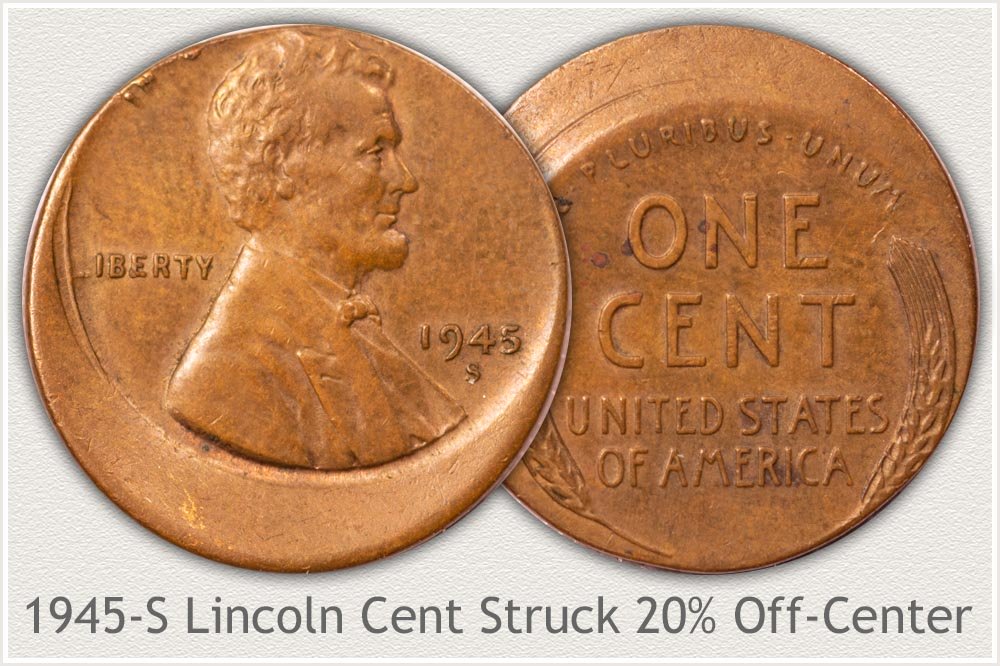
Error wheat pennies come in many forms. Different mintmark errors such as double punching of the mark is intensely studied and sought. Doubling of design elements during the preparation of working dies are also popular with collectors. Unintentional mistakes made during the striking process are legitimate errors and are of interest.
One striking error with high visual impact are known as off-center strikes. These coins were misaligned at the time of striking and the coin shows blank areas to the sides of the design. Visual appeal is key to placing a value on error coins.
A 1945-S penny struck approximately 15% to 20% off-center entered circulation and was quickly spotted and saved. Of the number of 1945-S cents available today this example does stand-out, displaying a special quality. Value is higher because of the error and there is a following of collectors.
References
US Mint. 1946 US Mint Annual Report
https://nnp.wustl.edu/library/publisherdetail/51
US Mint. Coin Term glossary. https://www.usmint.gov/learn/collecting-basics/glossary
Coin Values | CoinStudy Articles
Lincoln Wheat cents span the years 1909 through 1958. From the top condition coins collected by advanced collectors to worn examples; to an affordable collection for young collectors, the range of value is extensive. Identify your date, mint and condition and refer to the value chart.
Coin series enjoy different levels of popularity within the hobby. Lincoln cents are avidly collected and pursued. Values are directly related to their interest by collectors. Knowing a coin is in demand by many is an understanding into your coins.
★ Coin Values Discovery finds 1945 Penny Value and...
All US coin values. Recognize your old coins using the image links leading to value charts. Date | Mintmark | Condition are considered; all described and imaged within each series. Surprising value is often found in the smallest of detail.